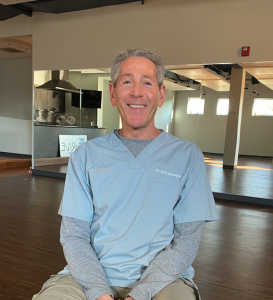
May is Mental Health Awareness Month
 Dr. Scott Greenapple
Dr. Scott Greenapple
May has been deemed Mental Health Awareness Month.
In this article, I will combine some thoughts and theories and offer “tools” to help people become aware and educated. I will also offer some guidance for you or anyone you may know who suffers from this disease.
Mental health issues are on the rise at alarming rates. Many theories are being studied and observed as to the reasons. Some of the most obvious stem from political unrest in this country and the world; the constant reality of war, poverty, climate change, financial struggle, and the barrage of news from social media are certainly at the top of reasonings. And, of course, the more personal ones such as family dynamics-dysfunction, trauma, genetics, chronic disease, pain, inter and intra personal dynamics, etc.
There are many ways to “treat” and help those who struggle with mental health issues, and we will cover a few within this article.
According to some theories and research on mental health, there is a concept of breaking down emotions into two categories:
- Thoughts, stories, and beliefs you hold in the mind, both conscious and subconscious.
- Feelings associated with the body. These can be perceived or real-true traumas that are “stuck” in the body, for lack of a better word. The old adage goes, ” Issues go to tissues.”
Mental health issues can and often are addressed pharmacologically in our country with things like SSRIs (selective serotonin reuptake inhibitors). These drugs help ensure serotonin, a neurotransmitter, is made available in good quantities for the brain.
This is one way and does have benefits, yet with all the drugs addressing these maladies, mental health issues like depression and anxiety are still on the rise. There are many other ways to treat mental health, either in conjunction with pharmacology or on their own.
There are several ways to deal with mental health, and one of the more traditional ways is “Talk Therapy.” Talk therapy primarily involves verbal communication between the therapist and the patient. It focuses on exploring thoughts, beliefs, emotions, and behaviors through conversation. Talk therapy encourages patients to gain insight into their thoughts and behaviors, challenge maladaptive patterns, and develop coping strategies through reflection, analysis, and discussion.
Another way and a somewhat newer approach is what is termed “Somatic Therapy”. Somatic therapy emphasizes and integrates the body-mind connection and recognizes the emotional and psychological issues often manifest in bodily sensations, tension, and movement patterns. Somatic therapists work with patients to explore and process emotions, traumas, and psychological issues through bodily experiences, such as sensations, breathwork, movement, and touch. Somatic therapy is often used in trauma treatment, as it recognizes that trauma is stored in the body and aims to release it through somatic techniques.
Trauma is one of the primary enablers of mental health disease. There are a few types of trauma. One we consider “Big T”, PTSD from war, physical molestation, emotional distress from grief like death, disease/diagnosis, divorce etc. Somatic therapy releases unconscious emotions held in the body and creates body awareness. It helps to tap into inner resources, wisdom, and intuition without judgment.
Interoception refers to the perception of internal bodily sensations.
It’s how we sense and interpret signals from within our bodies, such as hunger, thirst, heartbeat, and feelings of pain or discomfort. Interoceptive awareness is also linked to emotional processing and self-awareness, as it allows us to recognize and respond to our own emotional states. Think of the words or sayings we use to describe feelings related to an emotion in our body.
Sayings like “That comment from that person makes me sick to my stomach,” “That politician makes me nauseous with their comments,” and “My co-worker literally gives me a pain in the neck.” Or, from positivity, “The first time I met my love, I had butterflies in my stomach.” “When I see my child, my heart goes pitter-patter.” These are feelings in the viscera that stem from an emotion. Awareness of interoception regulates our bodies and, in turn, regulates our emotions. Conversely, not being aware of interoception has been shown to increase depression, anxiety, PTSD and decrease psychological homeostasis.
The most common areas in the body that are affected by emotional upheaval or unresolved distress are:
- Head and jaw. Think of tension in the facial muscles, TMJ, headaches, and tinnitus.
- My neck and shoulders have a tremendous amount of tension there, literally pain me in the neck.
- Chest, heart, panic attacks, like an elephant sitting on my chest, hyperventilation.
- Abdominal, G.I. issues, irritable bowel, stomach ache, stress-diarrhea.
Some of my favorite ways to address mental health issues with Somatic therapies are:
- Acupuncture (moves stagnation or that stuck feeling in the body)
- Qi Gong (movement, breath and meditation)
- Mindfulness meditation (becoming aware and present of your thoughts)
- Breath work
- Tai Chi
- Yoga
- EMDR (Eye movement desensitization and reprocessing).
Mental health is a complex disease, and there are many ways to help address your particular situation. Often, a combination of therapies, drugs, socialization, diet, and exercise is needed to determine which will have the best impact on the situation.
If you are having any mental health issues, please reach out for help from friends, family, and/or physicians.
Awareness and recognition are key to moving forward in life.



